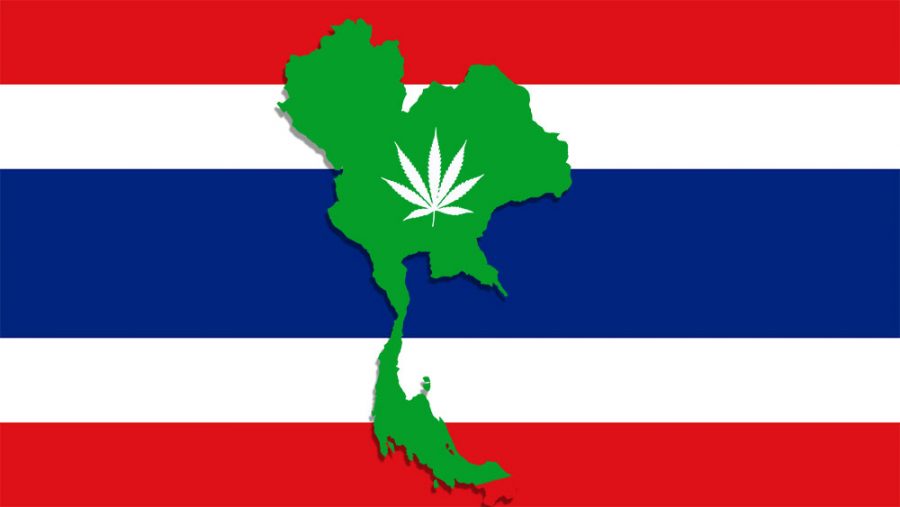Thailand is preparing to allow home cannabis cultivation for governmental use
Thailand’s medical cannabis laws will soon be amended to permit the cultivation of homegrown plants inside residents’ homes. All yields will be grown for one purpose only – to bulk up the government’s supply of pharmaceutical-grade weed.
“We are in the process of changing laws to allow the medical use of [cannabis] freely,” said Health Minister Anutin Charnvirakul. “We have high confidence that [cannabis] will be among the major agricultural products for Thai households. We are speeding up the law changes, but there is a process to it.”
Back in September, Anutin said he felt confident that Thai residents will soon be able to grow cannabis plants “in their back gardens like any other herb.”
Cannabis in Thailand: 12,000 cannabis seedlings planted in Chiang Mai on September 2
Anutin’s statement about the future of medical cannabis cultivation in Thailand was announced around the same time that researchers from Maejo University sowed 12,000 seeds in the mountainous northern city of Chiang Mai.
According to a report by the Asia Times, researchers got their hands on seedlings courtesy of the government’s Department of Medical Services. Government officials anticipate that the plants will be ready for harvest within six months.
By February 2020, the Government Pharmaceutical Organization (GPO) hopes to grow plants that will produce one million bottles of cannabis oil; each containing five milliliters of medicinal oil.
“The university will be a center where ordinary people can learn how to plant and grow good quality cannabis. Cannabis is not an issue of politics; it is a product that can benefit people’s health,” Anutin said.
Thailand could quite easily become a contender in the global medical cannabis market, with Anutin saying that he thinks the Kingdom has the potential to develop niche strains for export purposes.
“Issara” (independence) is the name of one of the strains developed by Maejo University researchers. It has a balanced tetrahydrocannabinol (THC) and cannabidiol (CBD) ratio of 1:1.
Residents could earn a nice monthly wage selling cannabis in Thailand to government
The people of Thailand stand to benefit greatly from home cultivation. Anutin encouraged voters to back him in his efforts by informing them that they could earn around $2,225 for each mature cannabis plant they sell to the government. For households that grows six plants and sell them to the government, the pay packet could soar to $13,350.
Since the average Thai person earns approximately 24,000 baht per month – equivalent to $8,200 annually – home cultivation could transform many lives. However, it should be noted that not every single plant will be accepted into the government’s medical cannabis program. According to experts, a plant must be of the highest quality upon maturing in order to be considered medical-grade.
Anutin says that Thailand’s low wages could grant the Kingdom a leading edge over international medical cannabis markets, which are significantly more costly in terms of manufacturing, production and sale. As a result of Thailand’s cheaper pricing, Anutin is determined that his country will attract plenty of overseas investor interest.
Bhum Jai Thai Party is pushing for cannabis legalization in Thailand
Anutin has played an important role in the ever-changing landscape of legal cannabis in Thailand. Back in March, during the time leading up to Thailand’s general election, he created a buzz by pushing for the legalization of home cannabis cultivation in the Asian country.
Amid the elections, Anutin fronted the Bhum Jai Thai Party, which means “Proud to be Thai” in English. He vowed to the Thai people that home cultivation – to the amount of six plants per household – would be legalized. Now, the pro-cannabis group is a part of Thailand’s ruling coalition.
Back in December 2018, Thailand made history as the first nation in Southeast Asia to legalize cannabis for medical purposes. At this time, the nation also legalized Kratom, which is a plant-based substance favoured for its sedating effects.
Currently, it is still illegal to possess, sell, buy or consume cannabis in Thailand for recreational purposes; punishments range from fines to imprisonment. On the other hand, Anutin’s efforts – along with increased awareness for legalization prompted by the Bhum Jai Thai party – could transform the future of Thailand’s cannabis laws forever.
Anutin believes that the Kingdom could experience an economic windfall if the plant is legalized for recreational purposes. He foresees that the money-making potential of cannabis will surpass that of industries such as rubber, rice, sugarcane and tapioca.








